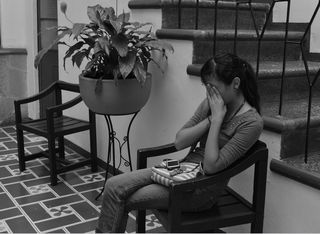Media
The Impact of Online Shaming on Young Lives
Why teens are more concerned about cyberbullying than drug use.
Posted September 24, 2017

With the rise of incivility today, there’s no doubt that America’s youth are being effected by their virtual life. Whether it’s sacrificing a college placement or being cyberbullied by their peers, it’s clear that social media can have serious downside to digital communications.
A recent survey by ReportLinker questioned teens and young adults between the ages of 13 and 24 to understand more about how social media impacts their lives.
It’s often easy to hide behind a quick text, snap, post or tweet – but the lasting effects can have a devastating effect on teens and their families.
In a 2015 survey released by Vodafone, 43 percent of teens believe that cyberbullying is a bigger problem than drug abuse.
So when we hear phrases such as,death by humiliation, it’s not a joke.
According to the survey:
- 41% of teens said cyberbullying made them feel sad, helpless and depressed
- 26% felt completely alone
- 18% experienced suicidal thoughts
- 21% stay home from school due to cyberbullying
- 38% don’t tell their parents they are being harassed online
Not telling their parents or an adult is an issue that has concerned experts and advocates for a long time. The reasons why kids don’t tell can range from the fear of having their life-line removed (being shut-down from the Internet), to being ashamed of what is happening online – to retaliation from the bully (being called a snitch by friends). This is why offline parenting is so crucial to online life. Building a bond of trust so your child knows that they can come to you no matter what they are facing online.
Research has shown that friend to friend support is one of the successful ways of preventing and addressing cyberbullying.
You’re never alone.
One of the most important elements kids need to know is they're never alone. Today there are a wide range of both offline and online resources available to help those that are hurting.
There are many resources online willing to assist you when you are struggling with cyberbullying and digital hate. The Tyler Clementi Foundation offers The Upstander Pledge to unite communities and AT&T has #LaterHaters Resource page with information to help you block out the haters. Are you a victim of non-consensual porn? Visit Cyber Civil Rights Initiative or Without My Consent.
The vessel that hurts you can sometimes be the one that helps you. Texting might be the way people are harming each other, but like social media, it has positive features. Crisis Text Line is available if you need immediate help. If you know someone is having a difficult time, yet don’t have the right words to say, send a #BeStrong emoji from Vodofone.
Who can help curb online hate?
When the youths in the ReportLinker survey were asked who they believed were best able to tackle cyberbullying and digital threats, the majority put the heat on social media platforms (33 percent) themselves and the users of the sites (35 percent).
Isn’t it time we all started taking accountability for our own behavior online? From the extreme case of Michelle Carter who was criminally charged for encouraging her friend to kill himself through text messages, to the 10 Harvard students that had their placements revoked due to messages on a Facebook group, to a 12 year-old that was allegedly bullied on Snapchat to death, it’s time to consider their social liability and stop saying, they’re only kids. If they’re old enough to have a keypad - they better be responsible enough to use one.
Empathy is the one sure way to combat hate online. Wither greater compassion for others, it should be impossible to leave cruel comments.


